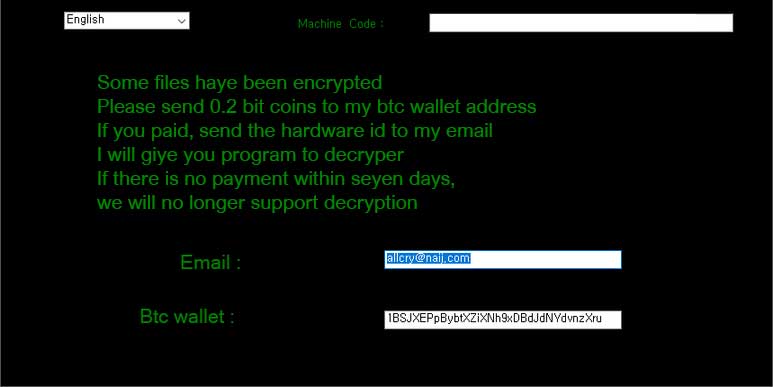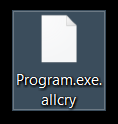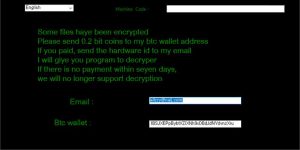 This article aims to help you remove the Allcry ransomware virus from your server and restore .allcry encrypted files.
This article aims to help you remove the Allcry ransomware virus from your server and restore .allcry encrypted files.
A ransom infection, attacking servers has been reported by malware researchers. The virus aims to slither onto the infected computer via a malicious file and it then encrypts important files on the server itself, adding the .allcry file extension to them. The malware then drops a ransom note, named “readme.txt” with a message asking victims to make a payoff in 0.2 BTC (BitCoins) to the wallet of the cyber-criminals. In addition to this, they leave an e-mail (allcry@naij.com) for contact. If you are a victim of the Allcry ransomware virus, it is strongly recommended to read this article and learn how to remove this ransomware and restore files, encrypted by it on your server or PC.

Threat Summary
| Name | Allcry |
| Type | Ransomware, Cryptovirus |
| Short Description | Aims to encrypt the files on the infected computer or server and then ask victims to pay 0.2 BTC to get the files working again. |
| Symptoms | Attacks files and adds the .allcry file extension to them after encryption. A black-green ransom note, named Allcry appears. |
| Distribution Method | Spam Emails, Email Attachments, Executable files |
| Detection Tool |
See If Your System Has Been Affected by malware
Download
Malware Removal Tool
|
User Experience | Join Our Forum to Discuss Allcry. |
| Data Recovery Tool | Windows Data Recovery by Stellar Phoenix Notice! This product scans your drive sectors to recover lost files and it may not recover 100% of the encrypted files, but only few of them, depending on the situation and whether or not you have reformatted your drive. |

How is Allcry Ransomware Spread
In order for it to be replicated, the Allcry virus may be sent to victims via e-mails of spamming character. Such e-mails are primarily created to deceive you into thinking they are legitimate messages from either a bank or a large retailer company. The messages have malicious e-mail attachments that are embedded within them and those attachments may pose as:
- Invoices.
- Purchase receipts.
- Registration confirmation letters.
- Fake banking statements.
- Account activity reports.
As soon as the victim is tricked into opening the e-mails themselves, he or she immediately becomes infected.
Besides via e-mail, the Allcry ransomware can also arrive on a computer via other methods as well, such as:
- Fake license activators.
- Fake game patches/cracks.
- If it pretends to be an installer.
Also, the virus creates multiple connections to advertisement networks, suggesting it may arrive on your machine via adware as well.

Allcry Ransomware – Malicious Activity Analysis
Once an infection occurs, the ransomware begins to drop multiple different types of files on the computers of victims:
%Program-specific location% \ QBridge.exe
When these two files are dropped, the virus automatically creates a process in Windows Task Manager, called winsrv.exe. The process is located in the following folder:
To download the previously mentioned QBridge.exe file, the Allcry ransomware virus executes the following command in Windows Command Prompt, using functions, programmed in winsrv.exe:
→ ping 127.0.0.1 -n 3> Nul & copy% \QBridge.exe
The virus may use the same command to update or patch the QBridge.exe file. It’s legal alibi is that it is an ad module and it even has a valid digital signature to support that, suggesting this virus is created by someone with experience in signatures as well.
In addition to thos actions, the winsrv.exe file, created in the system folder has also embedded scripts with Keep-Alive type of connection to specific third-party hosts. The hosts are ad servers.
Allcry ransomware is also configured to drop it’s file encrypter in the following location:
The virus also creates registry entries with values for the allcry.exe file:
– (default) = C: \ allcry.exe “% 1”
HKEY_CLASSES_ROOT \ .allcry
– (default) = Allcry Software
As soon as this is done, the Allcry ransomware also generates a script which automatically opens the “Allcry crypter” message each time you click to try and open an encrypted file. The message looks like the following:
Besides the main message which supports English, Korean and Chinese languages, another symptom of having this virus is it’s readme.txt ransom note file, which has the same message as the primary ransom note:
Contents of readme.txt:
Some files haye been encrypted
Please send 0.2 bit coins to my btc wallet address
If you paid, send the hardware id to my emailI will give you program to decryper
If there is no payment within seven days,
we will no longer support decryption
Email 2 allcy@alquds.oom
BTC wallet 2 lBSJXEPpBythZiXNthDBdeNdeanru
Vour Hardware ID

Allcry Ransomware – Encryption Process
The Allcry ransomware’s encryption targets files in the following Windows locations:
- Hard Disk.
- External hard drive.
- Network shared folders.
- USB or other external storage drives connected to your PC.
Among the files encrypted by this virus are a lot of file types, among which may be documents, videos, audio files, programs, .PDF types of files, archives, virtual drives and many others. Among the encrypted files may also be the following:
“PNG .PSD .PSPIMAGE .TGA .THM .TIF .TIFF .YUV .AI .EPS .PS .SVG .INDD .PCT .PDF .XLR .XLS .XLSX .ACCDB .DB .DBF .MDB .PDB .SQL .APK .APP .BAT .CGI .COM .EXE .GADGET .JAR .PIF .WSF .DEM .GAM .NES .ROM .SAV CAD Files .DWG .DXF GIS Files .GPX .KML .KMZ .ASP .ASPX .CER .CFM .CSR .CSS .HTM .HTML .JS .JSP .PHP .RSS .XHTML. DOC .DOCX .LOG .MSG .ODT .PAGES .RTF .TEX .TXT .WPD .WPS .CSV .DAT .GED .KEY .KEYCHAIN .PPS .PPT .PPTX ..INI .PRF Encoded Files .HQX .MIM .UUE .7Z .CBR .DEB .GZ .PKG .RAR .RPM .SITX .TAR.GZ .ZIP .ZIPX .BIN .CUE .DMG .ISO .MDF .TOAST .VCD SDF .TAR .TAX2014 .TAX2015 .VCF .XML Audio Files .AIF .IFF .M3U .M4A .MID .MP3 .MPA .WAV .WMA Video Files .3G2 .3GP .ASF .AVI .FLV .M4V .MOV .MP4 .MPG .RM .SRT .SWF .VOB .WMV 3D .3DM .3DS .MAX .OBJ R.BMP .DDS .GIF .JPG ..CRX .PLUGIN .FNT .FON .OTF .TTF .CAB .CPL .CUR .DESKTHEMEPACK .DLL .DMP .DRV .ICNS .ICO .LNK .SYS .CFG”
After the encryption, the files assume the .allcry file extension, which makes them appear like the following:
When you open the files, the virus is configured so that it actually opens the “Allcry crypter” ransom note instead.

Remove Allcry Crypter Ransomware and Restore .allcry Files
If you want to remove this virus manually, then we advise you to follow the manual removal instructions below. They are designed so that you isolate the threat and delete each file and revert any settings modified by it.
However, since Allcry creates multiple objects on your computer and may be tricky to delete, experts advise to remove it automatically using an advanced anti-malware software which scans and removes Allcry plus other unwanted software on your computer and protects it against future infections as well.
In order to restore as many files as possible after removing Allcry Crypter from your computer, we recommend you to follow the alternative methods for file recovery below in step “2. Restore files encrypted by Allcry”. They are created to help you restore as many files as you possibly can without having to pay the ransom.
- Step 1
- Step 2
- Step 3
- Step 4
- Step 5
Step 1: Scan for Allcry with SpyHunter Anti-Malware Tool
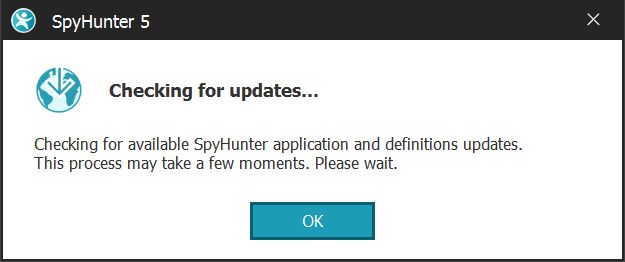
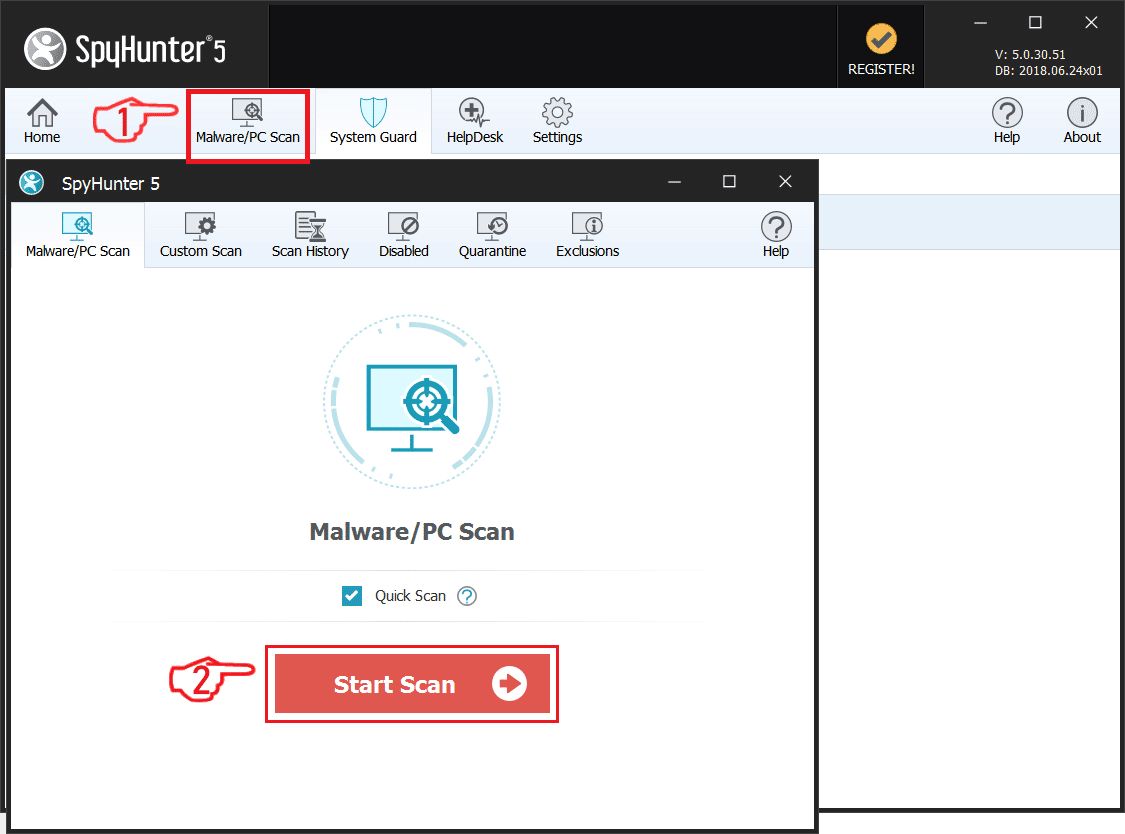
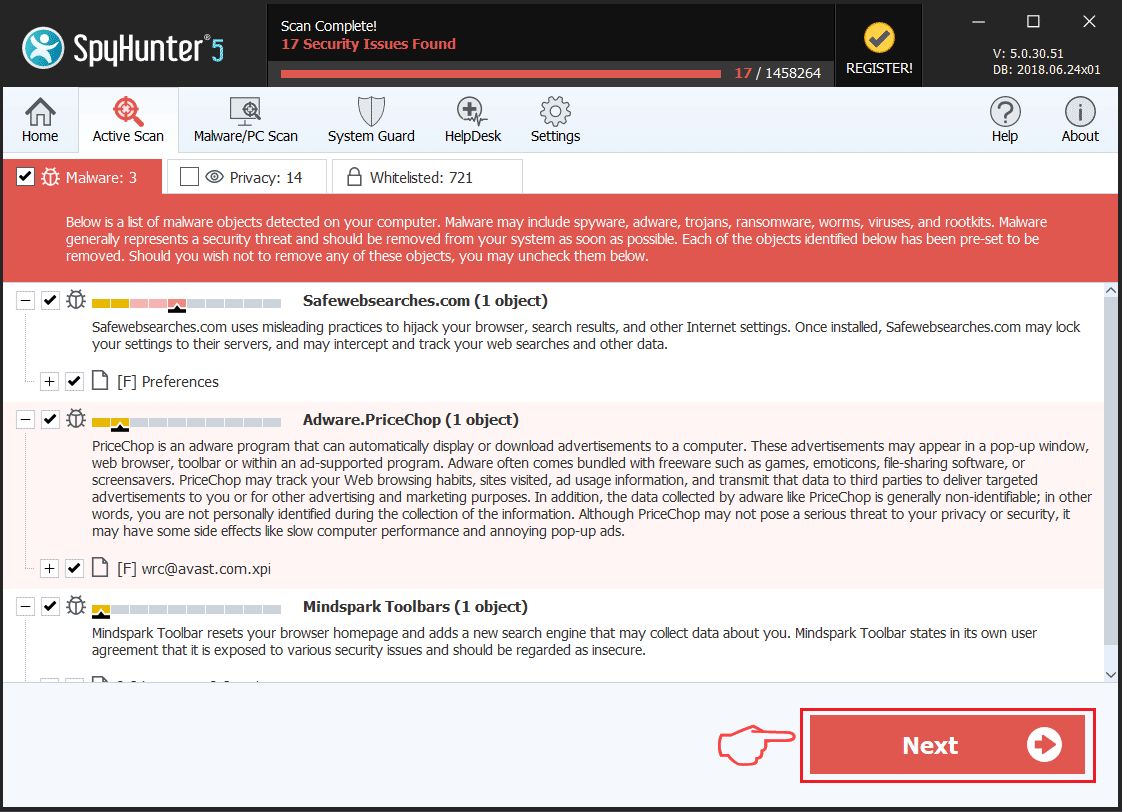
Ransomware Automatic Removal - Video Guide
Step 2: Uninstall Allcry and related malware from Windows
Here is a method in few easy steps that should be able to uninstall most programs. No matter if you are using Windows 10, 8, 7, Vista or XP, those steps will get the job done. Dragging the program or its folder to the recycle bin can be a very bad decision. If you do that, bits and pieces of the program are left behind, and that can lead to unstable work of your PC, errors with the file type associations and other unpleasant activities. The proper way to get a program off your computer is to Uninstall it. To do that:

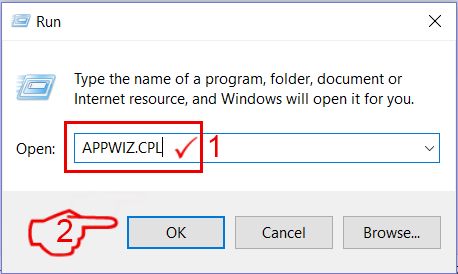
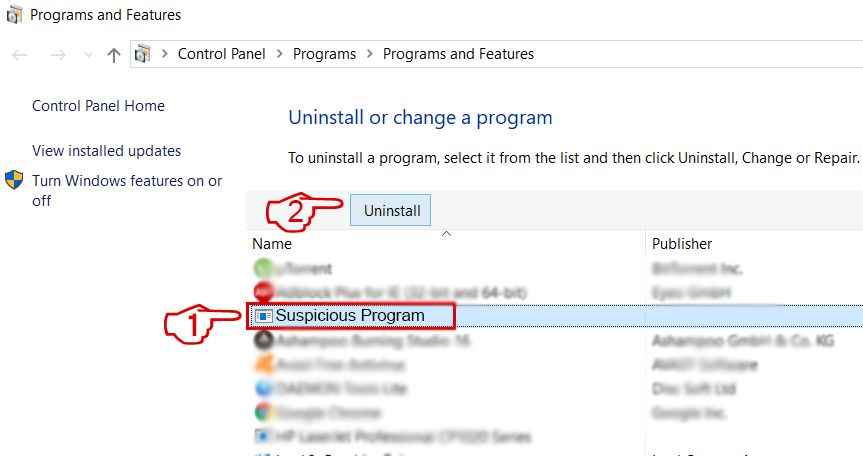 Follow the instructions above and you will successfully delete most unwanted and malicious programs.
Follow the instructions above and you will successfully delete most unwanted and malicious programs.
Step 3: Clean any registries, created by Allcry on your computer.
The usually targeted registries of Windows machines are the following:
- HKEY_LOCAL_MACHINE\Software\Microsoft\Windows\CurrentVersion\Run
- HKEY_CURRENT_USER\Software\Microsoft\Windows\CurrentVersion\Run
- HKEY_LOCAL_MACHINE\Software\Microsoft\Windows\CurrentVersion\RunOnce
- HKEY_CURRENT_USER\Software\Microsoft\Windows\CurrentVersion\RunOnce
You can access them by opening the Windows registry editor and deleting any values, created by Allcry there. This can happen by following the steps underneath:
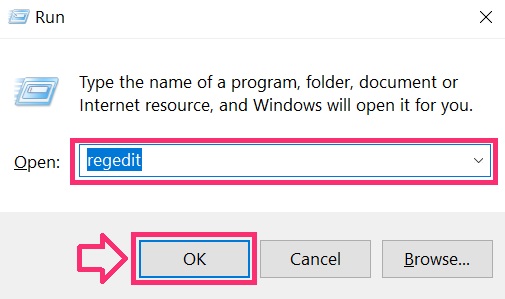

 Tip: To find a virus-created value, you can right-click on it and click "Modify" to see which file it is set to run. If this is the virus file location, remove the value.
Tip: To find a virus-created value, you can right-click on it and click "Modify" to see which file it is set to run. If this is the virus file location, remove the value.
Before starting "Step 4", please boot back into Normal mode, in case you are currently in Safe Mode.
This will enable you to install and use SpyHunter 5 successfully.
Step 4: Boot Your PC In Safe Mode to isolate and remove Allcry

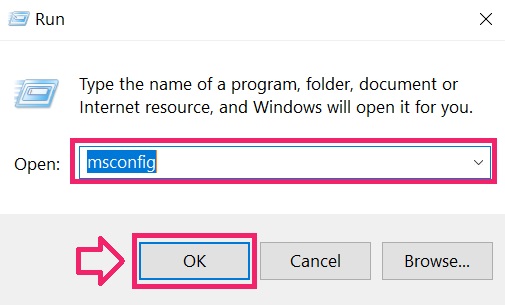
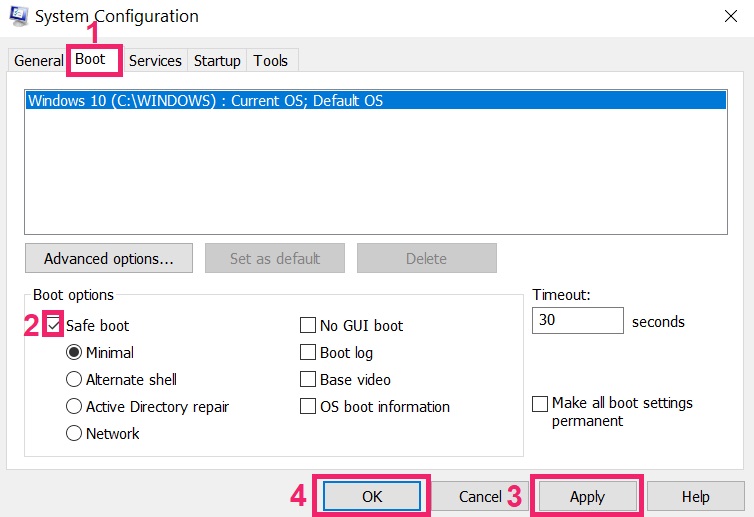
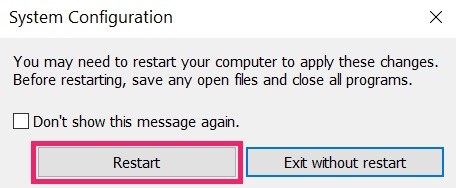
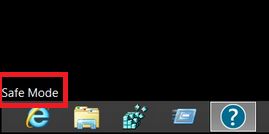
Step 5: Try to Restore Files Encrypted by Allcry.
Method 1: Use STOP Decrypter by Emsisoft.
Not all variants of this ransomware can be decrypted for free, but we have added the decryptor used by researchers that is often updated with the variants which become eventually decrypted. You can try and decrypt your files using the instructions below, but if they do not work, then unfortunately your variant of the ransomware virus is not decryptable.
Follow the instructions below to use the Emsisoft decrypter and decrypt your files for free. You can download the Emsisoft decryption tool linked here and then follow the steps provided below:
1 Right-click on the decrypter and click on Run as Administrator as shown below:
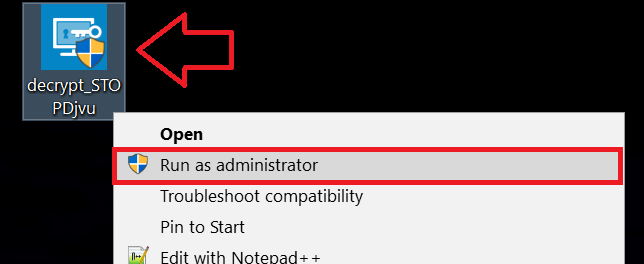
2. Agree with the license terms:
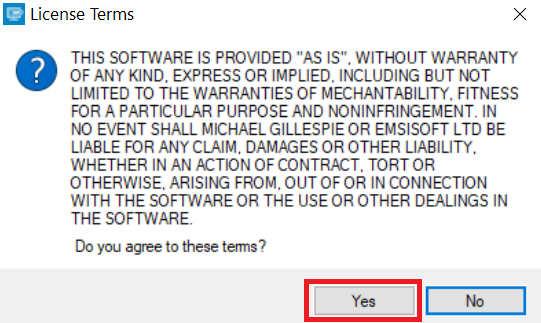
3. Click on "Add Folder" and then add the folders where you want files decrypted as shown underneath:
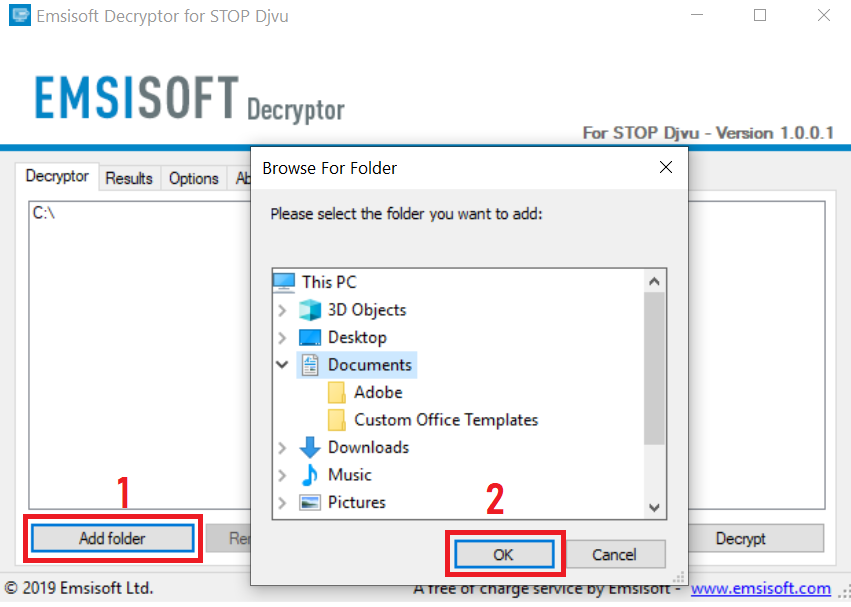
4. Click on "Decrypt" and wait for your files to be decoded.
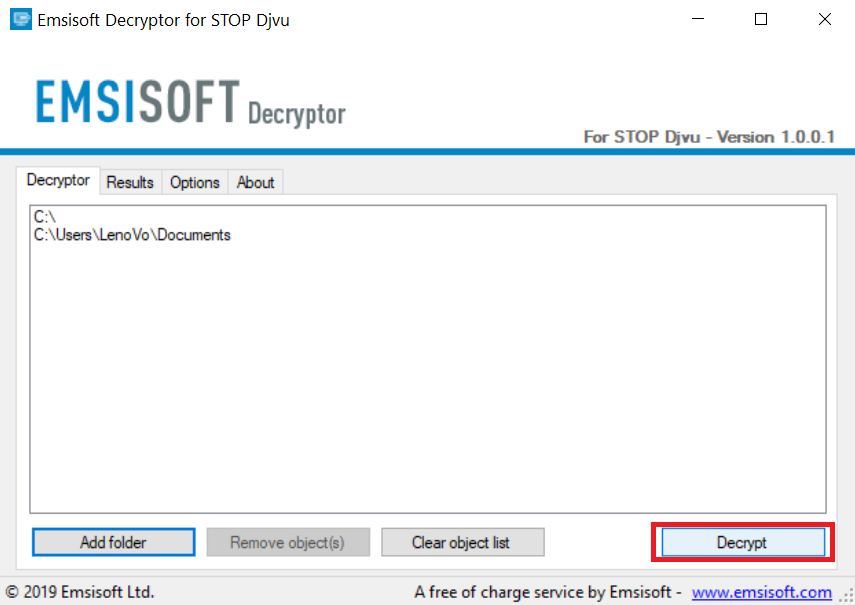
Note: Credit for the decryptor goes to Emsisoft researchers who have made the breakthrough with this virus.
Method 2: Use data recovery software
Ransomware infections and Allcry aim to encrypt your files using an encryption algorithm which may be very difficult to decrypt. This is why we have suggested a data recovery method that may help you go around direct decryption and try to restore your files. Bear in mind that this method may not be 100% effective but may also help you a little or a lot in different situations.
Simply click on the link and on the website menus on the top, choose Data Recovery - Data Recovery Wizard for Windows or Mac (depending on your OS), and then download and run the tool.
Allcry-FAQ
What is Allcry Ransomware?
Allcry is a ransomware infection - the malicious software that enters your computer silently and blocks either access to the computer itself or encrypt your files.
Many ransomware viruses use sophisticated encryption algorithms to make your files inaccessible. The goal of ransomware infections is to demand that you pay a ransom payment to get access to your files back.
What Does Allcry Ransomware Do?
Ransomware in general is a malicious software that is designed to block access to your computer or files until a ransom is paid.
Ransomware viruses can also damage your system, corrupt data and delete files, resulting in the permanent loss of important files.
How Does Allcry Infect?
Via several ways.Allcry Ransomware infects computers by being sent via phishing emails, containing virus attachment. This attachment is usually masked as an important document, like an invoice, bank document or even a plane ticket and it looks very convincing to users.
Another way you may become a victim of Allcry is if you download a fake installer, crack or patch from a low reputation website or if you click on a virus link. Many users report getting a ransomware infection by downloading torrents.
How to Open .Allcry files?
You can't without a decryptor. At this point, the .Allcry files are encrypted. You can only open them once they are decrypted using a specific decryption key for the particular algorithm.
What to Do If a Decryptor Does Not Work?
Do not panic, and backup the files. If a decryptor did not decrypt your .Allcry files successfully, then do not despair, because this virus is still new.
Can I Restore ".Allcry" Files?
Yes, sometimes files can be restored. We have suggested several file recovery methods that could work if you want to restore .Allcry files.
These methods are in no way 100% guaranteed that you will be able to get your files back. But if you have a backup, your chances of success are much greater.
How To Get Rid of Allcry Virus?
The safest way and the most efficient one for the removal of this ransomware infection is the use a professional anti-malware program.
It will scan for and locate Allcry ransomware and then remove it without causing any additional harm to your important .Allcry files.
Can I Report Ransomware to Authorities?
In case your computer got infected with a ransomware infection, you can report it to the local Police departments. It can help authorities worldwide track and determine the perpetrators behind the virus that has infected your computer.
Below, we have prepared a list with government websites, where you can file a report in case you are a victim of a cybercrime:
Cyber-security authorities, responsible for handling ransomware attack reports in different regions all over the world:
Germany - Offizielles Portal der deutschen Polizei
United States - IC3 Internet Crime Complaint Centre
United Kingdom - Action Fraud Police
France - Ministère de l'Intérieur
Italy - Polizia Di Stato
Spain - Policía Nacional
Netherlands - Politie
Poland - Policja
Portugal - Polícia Judiciária
Greece - Cyber Crime Unit (Hellenic Police)
India - Mumbai Police - CyberCrime Investigation Cell
Australia - Australian High Tech Crime Center
Reports may be responded to in different timeframes, depending on your local authorities.
Can You Stop Ransomware from Encrypting Your Files?
Yes, you can prevent ransomware. The best way to do this is to ensure your computer system is updated with the latest security patches, use a reputable anti-malware program and firewall, backup your important files frequently, and avoid clicking on malicious links or downloading unknown files.
Can Allcry Ransomware Steal Your Data?
Yes, in most cases ransomware will steal your information. It is a form of malware that steals data from a user's computer, encrypts it, and then demands a ransom in order to decrypt it.
In many cases, the malware authors or attackers will threaten to delete the data or publish it online unless the ransom is paid.
Can Ransomware Infect WiFi?
Yes, ransomware can infect WiFi networks, as malicious actors can use it to gain control of the network, steal confidential data, and lock out users. If a ransomware attack is successful, it could lead to a loss of service and/or data, and in some cases, financial losses.
Should I Pay Ransomware?
No, you should not pay ransomware extortionists. Paying them only encourages criminals and does not guarantee that the files or data will be restored. The better approach is to have a secure backup of important data and be vigilant about security in the first place.
What Happens If I Don't Pay Ransom?
If you don't pay the ransom, the hackers may still have access to your computer, data, or files and may continue to threaten to expose or delete them, or even use them to commit cybercrimes. In some cases, they may even continue to demand additional ransom payments.
Can a Ransomware Attack Be Detected?
Yes, ransomware can be detected. Anti-malware software and other advanced security tools can detect ransomware and alert the user when it is present on a machine.
It is important to stay up-to-date on the latest security measures and to keep security software updated to ensure ransomware can be detected and prevented.
Do Ransomware Criminals Get Caught?
Yes, ransomware criminals do get caught. Law enforcement agencies, such as the FBI, Interpol and others have been successful in tracking down and prosecuting ransomware criminals in the US and other countries. As ransomware threats continue to increase, so does the enforcement activity.
About the Allcry Research
The content we publish on SensorsTechForum.com, this Allcry how-to removal guide included, is the outcome of extensive research, hard work and our team’s devotion to help you remove the specific malware and restore your encrypted files.
How did we conduct the research on this ransomware?
Our research is based on an independent investigation. We are in contact with independent security researchers, and as such, we receive daily updates on the latest malware and ransomware definitions.
Furthermore, the research behind the Allcry ransomware threat is backed with VirusTotal and the NoMoreRansom project.
To better understand the ransomware threat, please refer to the following articles which provide knowledgeable details.
As a site that has been dedicated to providing free removal instructions for ransomware and malware since 2014, SensorsTechForum’s recommendation is to only pay attention to trustworthy sources.
How to recognize trustworthy sources:
- Always check "About Us" web page.
- Profile of the content creator.
- Make sure that real people are behind the site and not fake names and profiles.
- Verify Facebook, LinkedIn and Twitter personal profiles.


